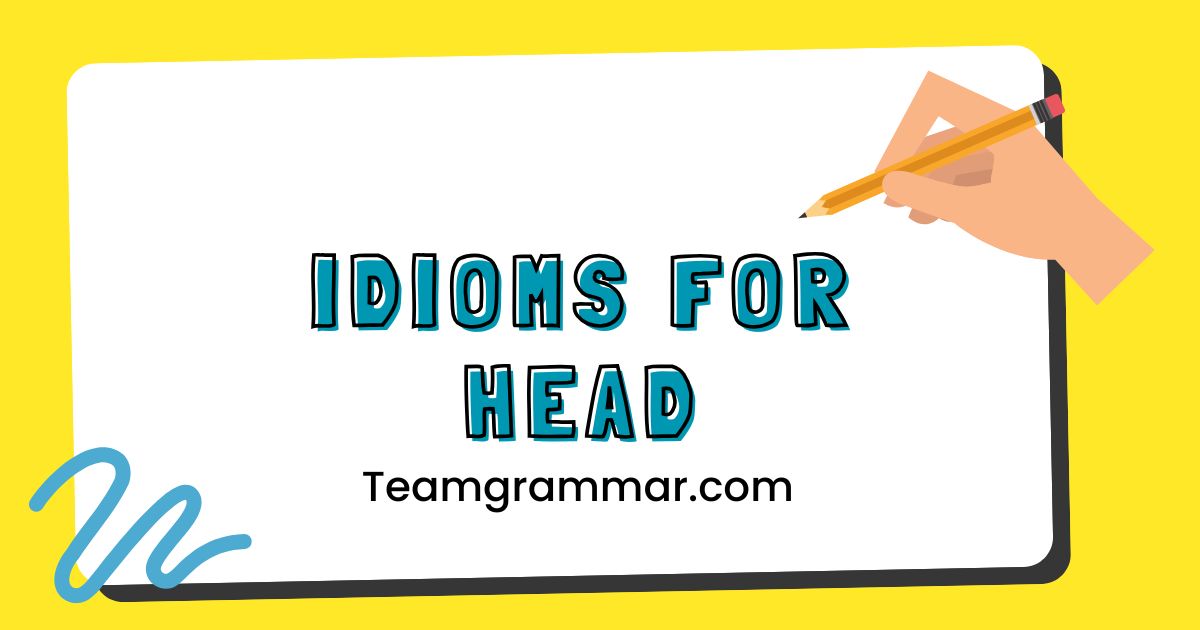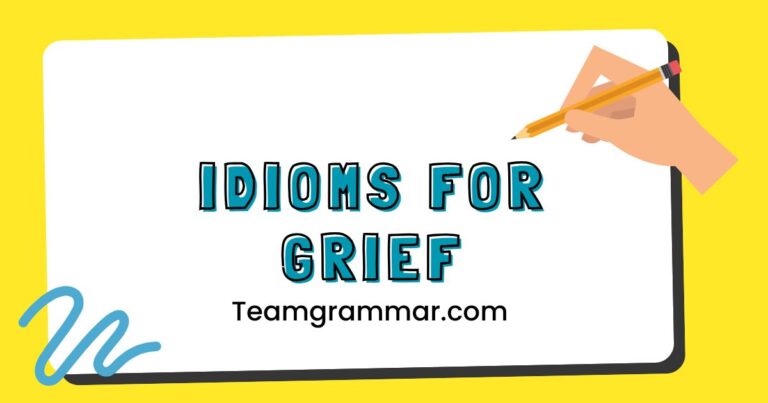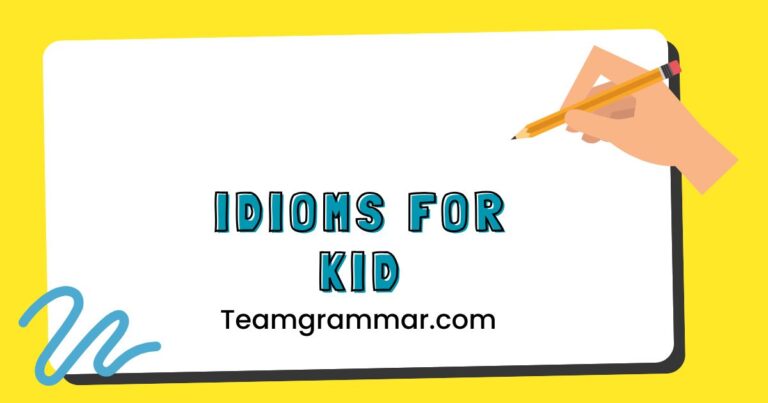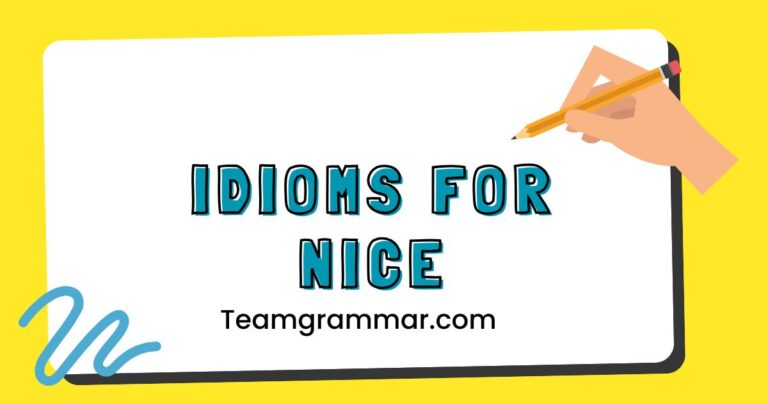44 Idioms for ‘Head’: Mastering Common English Expressions
Idioms are essential for understanding and communicating effectively in English. They add color, depth, and nuance to everyday language.
Focusing on idioms related to a specific word, like “head,” provides a structured way to expand your vocabulary and comprehension skills. This article explores a wide range of idioms featuring the word “head,” explaining their meanings, origins, and usage in various contexts.
It serves as a comprehensive guide for English language learners of all levels, from beginners to advanced speakers, aiming to improve their fluency and grasp of idiomatic expressions.
By mastering these idioms, learners can enhance their ability to understand native speakers, read English literature and articles with greater ease, and express themselves more naturally and authentically. This article provides detailed explanations, numerous examples, and practical exercises to solidify understanding and encourage confident application of these idioms in real-world situations.
Table of Contents
- Definition of Idioms and ‘Head’ Idioms
- Structural Breakdown of ‘Head’ Idioms
- Types and Categories of ‘Head’ Idioms
- Examples of ‘Head’ Idioms
- Usage Rules for ‘Head’ Idioms
- Common Mistakes with ‘Head’ Idioms
- Practice Exercises
- Advanced Topics in ‘Head’ Idioms
- Frequently Asked Questions
- Conclusion
Definition of Idioms and ‘Head’ Idioms
An idiom is a phrase or expression whose meaning cannot be understood from the literal meanings of its individual words. Instead, the idiom has a figurative meaning that is understood through common usage and cultural context.
Idioms add richness and complexity to language, making it more expressive and engaging. Mastering idioms is crucial for achieving fluency and a deeper understanding of any language.
‘Head’ idiomsare phrases that incorporate the word “head” and have a figurative meaning different from the literal sense of the word. These idioms often relate to thinking, leadership, problems, or a state of mind.
Understanding these idioms requires recognizing the implied meaning rather than simply translating the words directly. They are frequently used in both spoken and written English and are essential for effective communication.
The function of ‘head’ idioms is to convey complex ideas or emotions in a concise and memorable way. They can add humor, emphasis, or a more nuanced understanding to a conversation or text.
The context in which an idiom is used is crucial for interpreting its meaning correctly. Therefore, exposure to a wide variety of examples is essential for mastering their usage.
Structural Breakdown of ‘Head’ Idioms
The structure of ‘head’ idioms can vary widely. Some idioms are simple phrases, while others are more complex clauses.
Understanding the grammatical structure of these idioms can help in recognizing and using them correctly. Many ‘head’ idioms follow common grammatical patterns, such as verb phrases or prepositional phrases.
For example, the idiom “to lose one’s head” follows the structure “to + verb + possessive pronoun + head.” This structure indicates a common pattern where the verb describes an action related to the head. Similarly, the idiom “head over heels” is a prepositional phrase that describes a state of being.
Recognizing these patterns can make it easier to learn and remember new idioms.
The grammatical function of ‘head’ idioms can also vary. Some idioms act as verbs, describing an action or state, while others act as adverbs, modifying a verb or adjective.
For instance, “to come to a head” functions as a verb phrase, while “off the top of one’s head” functions as an adverbial phrase. Being aware of these grammatical functions helps in using idioms accurately within sentences.
Types and Categories of ‘Head’ Idioms
Idioms involving “head” can be categorized based on their meanings and the contexts in which they are used. This categorization helps in better understanding and applying these idioms effectively.
Idioms Related to Thinking and Intelligence
These idioms describe the ability to think clearly, solve problems, or possess intelligence. They often relate to mental processes and cognitive skills.
Idioms Related to Leadership and Authority
These idioms pertain to being in charge, making decisions, or having authority over others. They often involve responsibility and control.
Idioms Related to Problems and Challenges
These idioms describe difficult situations, conflicts, or issues that need to be resolved. They often involve stress, pressure, or obstacles.
Idioms Related to States of Mind and Emotions
These idioms describe feelings, attitudes, or emotional states. They often involve happiness, sadness, anger, or confusion.
Idioms Related to Physical Actions Involving the Head
These idioms describe actions that involve the head, such as nodding, shaking, or turning. They often convey agreement, disagreement, or attention.
Examples of ‘Head’ Idioms
The following tables provide extensive examples of ‘head’ idioms, categorized by their meaning. Each example is accompanied by a sentence illustrating its usage.
Idioms Related to Thinking and Intelligence
This table provides examples of idioms related to thinking and intelligence. Each entry includes the idiom, its meaning, and a sentence illustrating its use in context.
Understanding these idioms enhances comprehension of nuanced expressions about mental capabilities.
| Idiom | Meaning | Example Sentence |
|---|---|---|
| To have one’s head in the clouds | To be out of touch with reality; daydreaming | He always has his head in the clouds and never pays attention in class. |
| To have a good head on one’s shoulders | To be intelligent and practical | She has a good head on her shoulders and always makes wise decisions. |
| To have a head for figures | To be good at mathematics | Accountants need to have a head for figures to succeed in their profession. |
| To rack one’s brains | To try very hard to remember or think of something | I racked my brains, but I couldn’t remember where I had left my keys. |
| To use one’s head | To think carefully and intelligently | You need to use your head if you want to solve this problem. |
| To be head and shoulders above | To be much better than others | In terms of skill, she is head and shoulders above the other players. |
| To bury one’s head in the sand | To ignore or avoid a problem or unpleasant situation | You can’t bury your head in the sand and pretend the problem doesn’t exist. |
| Two heads are better than one | Two people working together can solve a problem more easily than one person working alone | Let’s put our heads together; two heads are better than one. |
| Get one’s head around something | Understand something complicated | I couldn’t get my head around the new software at first, but now I understand it. |
| Head start | An advantage at the beginning of something | Starting early gave him a head start in the race. |
| Keep one’s head | Remain calm in a crisis | Even though the situation was chaotic, she managed to keep her head. |
| Off the top of one’s head | Without careful thought or preparation | I can’t remember the exact number off the top of my head. |
| Bang one’s head against a brick wall | Waste time trying to achieve something impossible | Trying to convince him is like banging your head against a brick wall. |
| Have one’s head screwed on right | Be sensible and practical | She’s a reliable employee; she has her head screwed on right. |
| In over one’s head | Involved in something too difficult to handle | He took on too many projects and is now in over his head. |
| To be light-headed | Feeling dizzy or faint | She felt light-headed after skipping breakfast. |
| To be pig-headed | Stubborn and refusing to change one’s mind | He’s too pig-headed to admit he was wrong. |
| To be thick-headed | Stupid or slow to understand | He’s a bit thick-headed, so you might need to explain it again. |
| To turn heads | Attract attention | Her stunning dress turned heads at the party. |
| Over one’s head | Too difficult to understand | The lecture was over my head, so I didn’t learn much. |
Idioms Related to Leadership and Authority
This table focuses on idioms that describe leadership and authority. These idioms are useful for understanding power dynamics and roles within organizations and social structures.
| Idiom | Meaning | Example Sentence |
|---|---|---|
| Head honcho | The person in charge; the boss | The head honcho made the final decision on the project. |
| Head up | To lead or manage | She will head up the new marketing campaign. |
| At the head of | Leading or in charge of | He stood at the head of the table during the meeting. |
| Heads will roll | People will be punished or lose their jobs | If the project fails, heads will roll. |
| Head and shoulders above the rest | Significantly superior to others | In terms of experience, she’s head and shoulders above the rest of the candidates. |
| To put heads together | To collaborate and share ideas | Let’s put our heads together and come up with a solution. |
| To come to a head | To reach a critical point | The conflict between the two departments finally came to a head. |
| Give someone their head | Allow someone to do what they want, even if it’s risky | The manager gave the intern his head on the project. |
| A price on someone’s head | A reward offered for someone’s capture or death | During the war, there was a price on the spy’s head. |
| Hit the nail on the head | Identify something exactly right | You’ve hit the nail on the head with your assessment of the situation. |
| Head of the class | The best student in a class | She was always head of the class in mathematics. |
| Headhunter | A recruiter who seeks out qualified candidates for executive positions | The company hired a headhunter to find a new CEO. |
| Having a swelled head | Being arrogant or conceited | After his promotion, he started having a swelled head. |
| Go to someone’s head | Make someone arrogant or conceited | The praise went to his head, and he became arrogant. |
| Bite someone’s head off | Respond angrily to someone | He bit my head off when I asked a simple question. |
| Keep one’s head above water | Manage to survive financially | It’s hard to keep my head above water with these high bills. |
| Lose one’s head | Become uncontrolled with anger or excitement | He lost his head and started shouting at everyone. |
| Make head or tail of something | Understand something at all | I can’t make head or tail of these instructions. |
| Out of one’s head | Crazy or insane | He must be out of his head to try such a dangerous stunt. |
| Over one’s head | Too difficult to understand | The technical jargon in the manual was completely over my head. |
Idioms Related to Problems and Challenges
This table presents idioms that describe problems and challenges. These expressions are useful for discussing difficulties, conflicts, and obstacles in various situations.
| Idiom | Meaning | Example Sentence |
|---|---|---|
| To be up to one’s head in | To be very busy or overwhelmed | I’m up to my head in work this week. |
| To be in over one’s head | To be involved in something too difficult to handle | He took on too many commitments and is now in over his head. |
| To knock heads together | To force people to cooperate or agree | The mediator had to knock heads together to resolve the dispute. |
| To butt heads | To clash or disagree strongly | The two managers often butt heads over project priorities. |
| To come to a head | To reach a critical point or crisis | The tension between them finally came to a head during the meeting. |
| A headache | A problem or nuisance | Dealing with customer complaints is a real headache. |
| Bury one’s head in the sand | Ignore a problem | You can’t just bury your head in the sand and hope the problem goes away. |
| Can’t make head nor tail of something | Unable to understand anything | I can’t make head nor tail of these instructions. |
| Get one’s head around something | Understand something difficult | I found it hard to get my head around the new software. |
| Hit the nail on the head | Say something that is exactly right | You’ve hit the nail on the head with that assessment. |
| Headcount | A count of the number of people in a group or organization | The company reduced its headcount due to financial difficulties. |
| Head-on collision | A direct confrontation or clash | The two companies had a head-on collision in the marketplace. |
| Head case | Someone who is eccentric or mentally unstable | He’s a bit of a head case, but he’s brilliant at his job. |
| Be at someone’s head | To nag or bother someone | She was at his head all day about finishing the chores. |
| To be off one’s head | To be crazy or irrational | He must be off his head to try such a dangerous stunt. |
| To be out of one’s head | To be under the influence of drugs or alcohol | He was completely out of his head at the party last night. |
| To do someone’s head in | To confuse or annoy someone | All the technical jargon did my head in. |
| To get something into one’s head | To understand or believe something | He finally got it into his head that he needed to study harder. |
| To go to someone’s head | To make someone arrogant or conceited | The praise went to his head, and he became arrogant. |
| To have one’s head examined | To be considered crazy or irrational | He should have his head examined if he thinks that’s a good idea. |
Idioms Related to States of Mind and Emotions
This table provides idioms that describe various states of mind and emotions. These expressions are useful for conveying feelings, attitudes, and emotional states in a more nuanced way.
| Idiom | Meaning | Example Sentence |
|---|---|---|
| Head over heels | Deeply in love | They fell head over heels for each other. |
| To lose one’s head | To become uncontrolled with anger or excitement | He lost his head and started shouting at everyone. |
| To keep one’s head | To remain calm in a crisis | She managed to keep her head during the emergency. |
| To be hot-headed | To be easily angered | He’s a hot-headed person and often reacts without thinking. |
| To be level-headed | To be calm and rational | She’s a level-headed person who always makes sound decisions. |
| To be light-headed | To feel dizzy or faint | She felt light-headed after skipping breakfast. |
| To be big-headed | To be arrogant or conceited | He’s become quite big-headed since his promotion. |
| To be soft-headed | To be foolish or easily deceived | He’s too soft-headed to see that he’s being taken advantage of. |
| To be clear-headed | To be thinking clearly and rationally | After a good night’s sleep, I felt clear-headed and ready to work. |
| To be empty-headed | To be unintelligent or lacking in serious thought | She’s often dismissed as empty-headed, but she’s actually very clever. |
| To have one’s head in the clouds | To be daydreaming or out of touch with reality | He has his head in the clouds and rarely pays attention in class. |
| To keep one’s head down | To avoid attention or trouble | I’m just trying to keep my head down and get through the day. |
| To be in one’s head | To be preoccupied with thoughts or worries | The upcoming exam is really in my head. |
| To get something out of one’s head | To stop thinking about something | I can’t get that song out of my head. |
| To turn someone’s head | To cause someone to become infatuated or attracted | Her beauty turned many heads at the party. |
| To be headstrong | To be determined to have one’s own way | She’s a headstrong child who always does what she wants. |
| To be level-headed | To be calm and rational | She’s a level-headed person who always makes sound decisions. |
| To bite someone’s head off | To speak to someone angrily | He bit my head off when I asked a simple question. |
| To get it into one’s head | To finally understand something | He finally got it into his head that he needed to study harder. |
| To lose one’s head over someone | To become foolishly infatuated with someone | He lost his head over her and started acting irrationally. |
Idioms Related to Physical Actions Involving the Head
This table provides examples of idioms related to physical actions involving the head. These expressions often convey agreement, disagreement, or attention.
| Idiom | Meaning | Example Sentence |
|---|---|---|
| To nod one’s head | To show agreement or understanding | She nodded her head in agreement with the proposal. |
| To shake one’s head | To show disagreement or disapproval | He shook his head at the suggestion. |
| To hang one’s head | To feel ashamed or embarrassed | He hung his head in shame after being caught cheating. |
| To keep one’s head up | To remain positive and confident | Keep your head up, things will get better. |
| To bury one’s head in one’s hands | To show despair or distress | She buried her head in her hands after hearing the bad news. |
| To turn one’s head | To look at someone or something | She turned her head to see who was calling her name. |
| To crane one’s neck | To stretch one’s neck to see something | He craned his neck to get a better view of the stage. |
| To scratch one’s head | To show confusion or uncertainty | He scratched his head, trying to remember where he had parked the car. |
| To duck one’s head | To lower one’s head quickly to avoid being hit or seen | He ducked his head as he walked through the low doorway. |
| To bob one’s head | To move one’s head up and down rhythmically | He bobbed his head to the music. |
| To nod off | To fall asleep | He nodded off during the movie. |
| Use your head | Think carefully | Use your head and figure out a better way. |
| Off the top of one’s head | From memory, without preparation | Off the top of my head, I’d say there are about 20. |
| Head for the hills | To run away | When they saw the police, they headed for the hills. |
| Head-on | Directly, facing forward | The car crashed head-on into the tree. |
| Head start | An advantage at the beginning | She got a head start by studying over the summer. |
| Head trip | A confusing or disorienting experience | The movie was a real head trip. |
| Head case | An eccentric or crazy person | He’s a bit of a head case, but he’s harmless. |
| Head in the sand | Ignoring reality | He has his head in the sand about the financial problems. |
| Head count | Number of people present | Let’s do a head count before we leave. |
Usage Rules for ‘Head’ Idioms
Using ‘head’ idioms correctly involves understanding their specific meanings and contexts. It’s important to note that idioms cannot be translated literally, as their meaning is figurative and culturally specific.
Pay attention to the context in which the idiom is used to ensure accurate interpretation.
Rule 1: Understand the figurative meaning. The most important rule is to grasp the intended meaning of the idiom, which is often different from the literal meaning of the words. For example, “to lose one’s head” does not mean to physically lose your head, but rather to become overwhelmed or panic.
Rule 2: Consider the context. The context in which an idiom is used provides clues to its meaning. Pay attention to the surrounding words and phrases to understand how the idiom is being used.
Rule 3: Use the correct form. Some idioms have specific grammatical forms that must be followed. For example, “head over heels” must be used in that exact order, while other idioms may allow for some flexibility in word order.
Rule 4: Be aware of cultural nuances. Idioms are often tied to specific cultures or regions. Ensure that the idiom is appropriate for the audience and context.
Rule 5: Avoid overuse. While idioms can add color to your language, using too many idioms can make your speech sound unnatural or forced. Use them sparingly and appropriately.
Common Mistakes with ‘Head’ Idioms
One of the most common mistakes is literal interpretation of idioms. Because idioms have figurative meanings, interpreting them literally can lead to confusion and miscommunication.
Another common mistake is using idioms in the wrong context. Idioms are often specific to certain situations or audiences, and using them inappropriately can sound awkward or unnatural.
Mistake 1: Literal Interpretation
Incorrect: “He literally lost his head and couldn’t find it.”
Correct: “He lost his head and started shouting at everyone.” (Meaning: He became overwhelmed and angry.)
Mistake 2: Incorrect Context
Incorrect: “The CEO is the head honcho of the company, so he always cleans the office.” (Using a casual idiom in a formal context.)
Correct: “The CEO is the head honcho of the company, so he makes all the major decisions.” (Using the idiom appropriately.)
Mistake 3: Misusing the form
Incorrect: “Heads over heels she was.”
Correct: “She was head over heels in love.”
Mistake 4: Overusing Idioms
Incorrect: “Well, to hit the nail on the head, I’m head over heels with this idea and I think we should head it up right away because two heads are better than one, right?”
Correct: “I really like this idea and think we should start working on it immediately. Collaboration will be key to its success.”
Practice Exercises
These exercises will help you practice using ‘head’ idioms correctly. Choose the correct idiom to complete each sentence.
Exercise 1: Fill in the Blanks
Complete the following sentences with the appropriate ‘head’ idiom from the list provided.
Idiom List: head over heels, lose your head, keep your head, head start, head honcho, hit the nail on the head, in over their heads, bury their head in the sand, off the top of my head, head and shoulders above
| Question | Answer |
|---|---|
| 1. They fell __________ for each other during their first date. | head over heels |
| 2. It’s important to __________ in a crisis. | keep your head |
| 3. The __________ of the company is responsible for making all the major decisions. | head honcho |
| 4. You __________ when you said that the problem was due to lack of communication. | hit the nail on the head |
| 5. The students are __________ with assignments and exams this semester. | in over their heads |
| 6. I can’t remember the details __________, but I can check the records later. | off the top of my head |
| 7. She’s __________ the other candidates in terms of experience and qualifications. | head and shoulders above |
| 8. If you __________ and ignore the problem, it will only get worse. | bury your head in the sand |
| 9. Getting a good education can give you a __________ in your career. | head start |
| 10. Don’t __________ and start yelling; try to remain calm. | lose your head |
Exercise 2: Multiple Choice
Choose the best idiom to complete each sentence.
| Question | Answer |
|---|---|
| 1. He is so stubborn; it’s like ____________ trying to convince him. a) banging your head against a brick wall b) losing your head c) keeping your head |
a) banging your head against a brick wall |
| 2. I can’t __________ of these instructions; they’re too complicated. a) make head or tail b) lose my head c) keep my head |
a) make head or tail |
| 3. The manager had to __________ to resolve the dispute between the employees. a) bury their heads b) knock heads together c) lose their heads |
b) knock heads together |
| 4. She’s a bit of a __________, but she’s brilliant at her job. a) head start b) head case c) head honcho |
b) head case |
| 5. The praise seemed to __________ and he became arrogant. a) go to his head b) keep his head c) shake his head |
a) go to his head |
| 6. Let’s __________ and figure out how to solve this problem. a) bury our heads b) put our heads together c) lose our heads |
b) put our heads together |
| 7. She __________ when she heard the shocking news. a) bit her head off b) hung her head c) kept her head |
b) hung her head |
| 8. He __________ when he was asked a difficult question. a) scratched his head b) lost his head c) kept his head |
a) scratched his head |
| 9. She __________ and started shouting at everyone. a) kept her head b) lost her head c) nodded her head |
b) lost her head |
| 10. They __________ for the hills when they saw the police. a) made head or tail b) headed c) banged their heads |
b) headed |
Exercise 3: Sentence Completion
Complete the following sentences using a ‘head’ idiom that fits the context.
| Question | Answer | |
|---|---|---|
| 1. After the difficult exam, I felt completely __________. | out of my head | |
| 2. The project is so complex; I can’t __________ of it. | make head or tail | |
| 3. She always tries to __________ in a challenging situation. | keep her head | |
| 4. They are __________ in debt and don’t know how to get out of it. | in over their heads | |
| 5. He is so forgetful; he always has his __________ . | head in the clouds | |
| 6. It’s like __________ trying to convince him to change his mind. | banging your head against a brick wall | |
| 7. She needed a __________ in order to be successful in the race. | head start | |
| 8. The manager had to __________ to get the team to cooperate. | knock heads together | |
| 9. I can’t give you | 9. I can’t give you the exact figures __________. | off the top of my head |
| 10. She __________ when she realized she had made a mistake. | hung her head |







